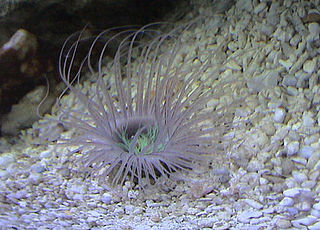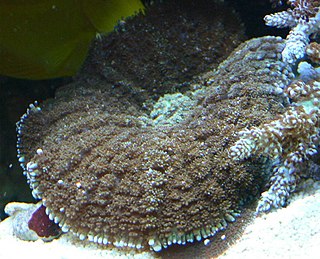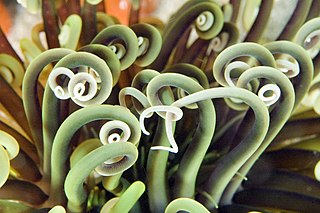
Actiniidae is the largest family of sea anemones, to which most common, temperate, shore species belong. Most members of this family do not participate in symbioses with fishes. Three exceptions are the bubble-tip anemone, snakelocks anemone and Urticina piscivora.

Tube-dwelling anemones or ceriantharians look very similar to sea anemones but belong to an entirely different class of anthozoans. They are solitary, living buried in soft sediments. Tube anemones live inside and can withdraw into tubes, which are composed of a fibrous material made from secreted mucus and threads of nematocyst-like organelles known as ptychocysts. Within the tubes of these ceriantharians, more than one polyp is present, which is an exceptional trait because species that create tube systems usually contain only one polyp per tube. Ceriantharians were formerly classified in the taxon Ceriantipatharia along with the black corals but have since been moved to their own class, Ceriantharia.

Edwardsia is a genus of sea anemones, the type of the family Edwardsiidae. They have eight mesenteries and live in tubes in the sand. The name, in Neo-Latin, commemorates the French zoologist Henri Milne-Edwards.

Rhodactis is genus of mushroom corals which are characterized by large individual polyps that are often reminiscent of a mushroom. Rhodactis are related to stony corals but do not produce a stony skeleton.

Alicia is a genus of sea anemones in the family Aliciidae and contains the following species:

Pseudactinia is a genus of sea anemones in the family Actiniidae.

Bunodactis is a genus of sea anemones in the family Actiniidae.

Parazoanthus is a genus of anemone-like anthozoans in the order Zoantharia.

Urticina is a genus of relatively large and often colorful sea anemones in the family Actiniidae from the North Pacific, North Atlantic and Arctic Oceans.

Peachia is a genus of sea anemone in the family Haloclavidae. Members of this genus typically burrow into soft substrates. The only part of the animal that is normally visible is the oral disc and tentacles which lie flat on the sand in a star shape. The type species is Peachia cylindrica.

Urticina columbiana, common names crusty red anemone, Columbia sand anemone, sand anemone, and the sand-rose anemone, is a species of sea anemone in the family Actiniidae.

Haliclystidae is a family of stalked jellyfish in the order Stauromedusae.

Cerianthidae is a family of tube-dwelling anemones in the order Spirularia of the subclass Ceriantharia.
Urticinopsis antarctica is a species of sea anemone in the family Actiniidae. It is found in the Southern Ocean around Antarctica.

Actinostolidae is a family of sea anemones in the order Actiniaria. Members of this family are deep sea species, with some occurring at hydrothermal vents.

Actinostola is a genus of sea anemones in the order Actiniaria. All members of this genus are deep-sea species, with some occurring at hydrothermal vents.

Diadumene is a genus of sea anemones. It is the only genus in the monotypic family Diadumenidae.

Bolocera is a genus of sea anemone in the family Actiniidae.
Bathyphelliidae is a family of sea anemones.















